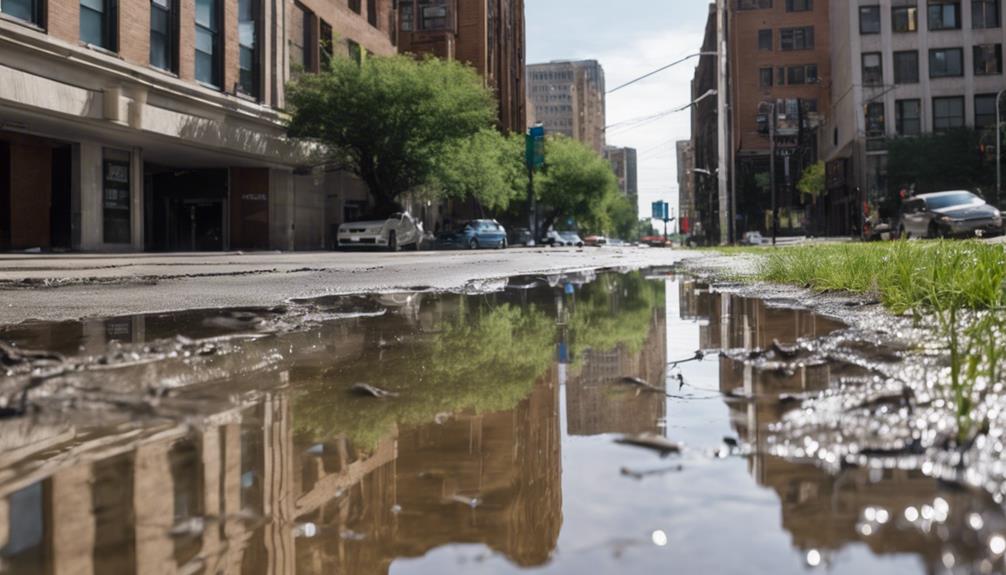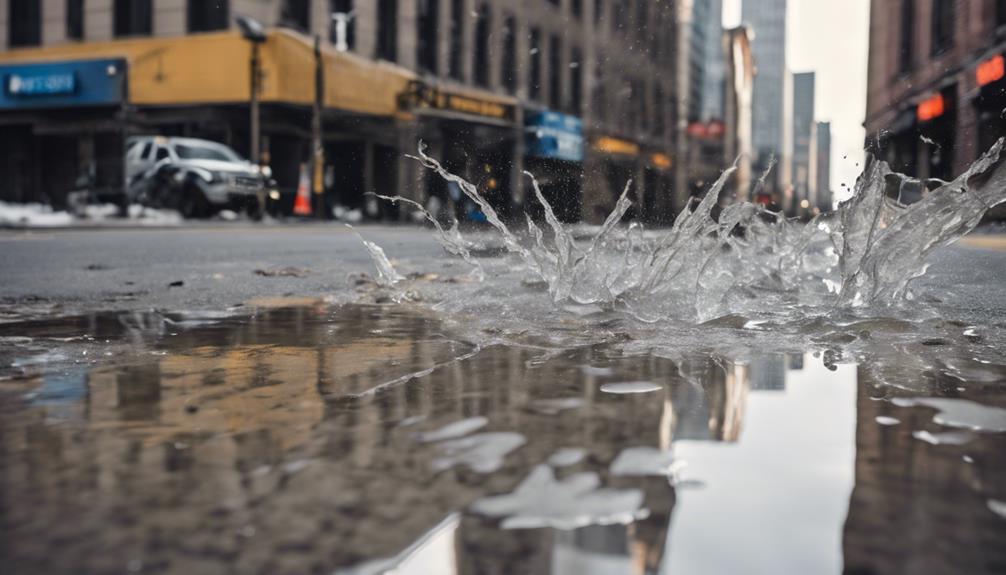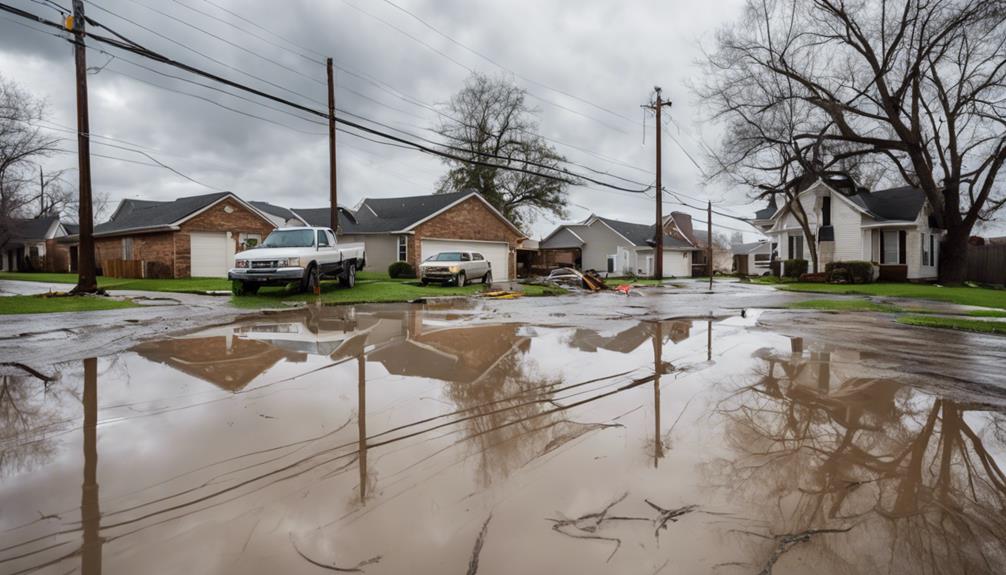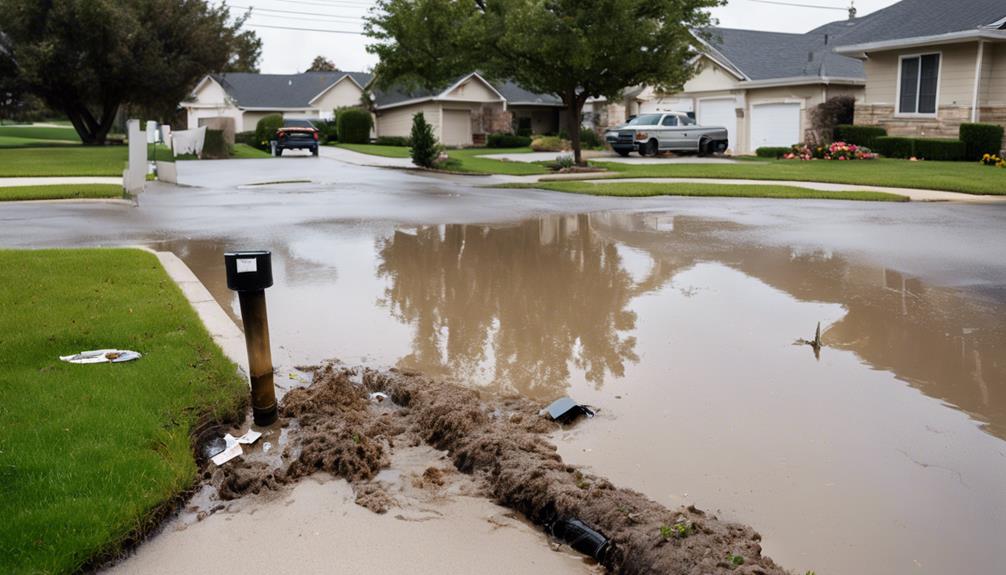
If a water main breaks and causes damage to your property, understanding who's responsible isn't always straightforward. Generally, homeowners are accountable for their service lines, while municipalities handle repairs to the main water supply. This means you might bear the costs for damages if the break occurs on your property. Promptly reporting the incident to local authorities is crucial, as the municipality may be liable if the break is due to negligence or aging infrastructure. Knowing your insurance coverage is also essential, as many policies exclude such damages. There's more to uncover regarding responsibility and potential compensation options.

Water main breaks can wreak havoc on communities, causing significant disruption and damage. A water main is the primary pipe that carries water underground, while the water service line consists of the smaller pipes connecting that main to your property.
With over 240,000 water main breaks happening annually in the U.S., it's crucial for every property owner to understand their role in this scenario. Homeowners should also be aware of their insurance coverage for water damage, as insurance coverage for water damage can significantly impact their financial responsibility in these situations.
Local municipalities typically handle repairs on public water mains, but as a homeowner, you're responsible for maintaining and repairing the water service lines on your property. When a break occurs, addressing it promptly is vital to prevent further damage to your home and the surrounding area.
Factors like aging infrastructure, environmental conditions, and poor maintenance practices often contribute to these breaks, so staying informed can help you react quickly.
Additionally, you should check your homeowners insurance policies to understand your coverage regarding water service line issues. Knowing what's included can save you from unexpected financial burdens when a water main break affects your property.
Always report breaks to local authorities to ensure swift repairs and minimize damage to personal and public infrastructure.
When a water line breaks, knowing who's responsible for repairs is crucial.
As a homeowner, you'll need to take care of the service line connecting your property to the main, while the municipality handles issues with public water mains.
It's also important to consider how your insurance might cover these situations.
As a homeowner, you're directly responsible for the maintenance and repair of the water service line that connects your property to the main supply. If that line breaks, it's crucial to address the problem immediately to prevent further damage to your property. A broken water main can lead to significant issues if left unattended, including flooding and costly repairs.
You should familiarize yourself with the location of your water service line, as this will help determine your liability if a break occurs. Your responsibility includes not only repairs but also ensuring that you report any water main breaks to local authorities. This way, public repairs can be carried out efficiently.
While homeowners insurance may cover some damages resulting from a broken water main, it's essential to understand the specifics of your policy. Some policies may not include coverage for certain types of water damage, so check to see if your homeowners insurance covers water-related incidents effectively.
Being proactive about your repair responsibilities can save you from future headaches and financial strain.
Municipalities play a crucial role in addressing water main breaks that occur on public property, ensuring the safety and integrity of the water supply system. Under municipal liability, local governments are typically responsible for the repairs needed after such incidents.
Here's what you should know:
When a water main break occurs, it's essential for municipalities to act swiftly to mitigate damages and restore service.
You might wonder how this affects you as a homeowner or business owner. If damage occurs due to a break, understanding municipal liability can help clarify who's responsible for repairs. Knowing your local laws can empower you to seek recourse if you're negatively impacted.
Ultimately, municipalities are tasked with ensuring that public property remains safe and functional for all community members.
Navigating insurance coverage can be daunting for homeowners facing the aftermath of a water main break. Typically, you're responsible for repairs to your private water service lines, while municipalities handle public water main repairs.
Unfortunately, standard homeowners insurance policies often exclude damages caused by municipal water supply issues, leaving you with potentially significant out-of-pocket expenses for repairs.
When assessing coverage, it's crucial to determine the source of the water causing the damage. If the water main break is the culprit, chances are your standard homeowners policy won't cover the resulting water damage.
To mitigate your financial risks, consider optional endorsements or separate flood insurance policies. These can provide additional protection specifically tailored for incidents like water main breaks or flooding events.
Moreover, understanding local regulations and the specifics of your insurance policy can help you navigate potential liabilities effectively.
By familiarizing yourself with what your insurance can and can't cover, you can ensure you have adequate coverage for water damage incidents and avoid unexpected costs.
Always review your policy and consult with your insurance agent for the best protection against water main break damages.

When a water main break occurs, understanding who bears financial liabilities can be complex. Typically, the at-fault party doesn't pay damages directly; instead, insurance companies handle claims from affected property owners. You'll need to assess your situation to determine your options for compensation.
Here are some key considerations regarding financial liabilities:
Since public entities often manage water mains, you could face challenges in proving negligence.
However, if you gather the right evidence and possibly seek legal assistance, you can maximize your chances of receiving compensation for the damage.
Understanding these financial liabilities is essential, as they'll impact your recovery process after a water main break.
Don't hesitate to consult professionals to help you through this intricate landscape.
When it comes to water main breaks, several key factors play a role.
You might notice that aging infrastructure can lead to increased failures, while environmental conditions can shift soil and disrupt pipes.
Additionally, improper maintenance and installation practices can further compromise the integrity of your water system.
Extreme weather variations play a crucial role in the frequency of water main breaks. These environmental factors can lead to soil shifts, which put pressure on the pipes and increase the risk of breaks.
When you consider how various conditions impact water mains, the picture becomes clearer:
Corrosion is another significant issue, with aging infrastructure making older pipes more susceptible to deterioration.
Additionally, high water flow demands can raise pressure within the system, further increasing the likelihood of breaks.
Improper installation adds another layer of vulnerability, as misaligned or poorly supported water mains are at greater risk.
Aging infrastructure poses significant challenges for water main reliability, especially when paired with environmental stressors. Many water pipes, installed decades ago, have deteriorated due to corrosion and material fatigue. This issue is critical, as over 240,000 water main breaks occur annually in the U.S., according to the Environmental Protection Agency. These breaks illuminate the urgent need for regular maintenance and upgrades to aging pipelines.
The lifespan of a water main can vary greatly depending on its material. For instance, cast iron pipes typically last 50 to 100 years, while newer materials may offer greater durability. Unfortunately, many older systems are susceptible to environmental factors like soil shifts, extreme weather, and ground movement. These conditions increase pressure on aging systems, leading to a higher risk of breaks.
Additionally, insufficient maintenance and delayed inspections can accelerate the deterioration of these water mains. When regular upkeep isn't prioritized, the likelihood of sudden failures rises, causing damage that can affect communities significantly.
Addressing these aging infrastructure challenges is essential to mitigate the impact of water main breaks on public safety and property.
Maintenance and installation issues play a critical role in the occurrence of water main breaks. When you consider the condition of water pipes, you'll notice that aging infrastructure and improper practices contribute significantly to these failures.
Here are some key factors to keep in mind:
Regular maintenance is crucial to catch issues early and prolong the life of water mains.
When installation isn't done correctly, it sets the stage for future problems. By addressing these maintenance and installation concerns, you reduce the risk of breaks and the costly damage that follows.
It's important for municipalities and utility companies to prioritize proper practices to ensure the reliability of water infrastructure. Ultimately, proactive measures can save everyone from the headaches associated with water main breaks.

When a water main breaks, the aftermath can be devastating, with consequences ranging from structural damage to the loss of personal belongings. As a homeowner, it's crucial to understand the types of damages you might face.
| Type of Damage | Description | Potential Costs |
|---|---|---|
| Structural Damage | Compromised integrity of your property due to water saturation. | High due to repairs and inspections. |
| Personal Belongings | Destruction of furniture, appliances, and treasured items. | Costs can add up quickly. |
| Indirect Costs | Expenses for temporary housing and additional living needs. | Can be substantial during repairs. |
These damages can lead to significant financial burdens, especially since standard homeowners insurance typically doesn't cover losses from water main breaks. You could find yourself facing out-of-pocket expenses for repairs and replacements. Understanding these potential damages is essential for taking the right steps post-incident and ensuring you're prepared for any financial implications that may arise from such a crisis.
Understanding your insurance coverage is crucial for protecting yourself against the financial fallout of a water main break. Many standard homeowners insurance policies don't cover damages from municipal water supply issues, as these are classified as external damages. This means you might face significant out-of-pocket expenses for repairs if a water main breaks near your home.
To navigate this complex situation, consider these key points:
To safeguard your property, take the time to review your policy and explore additional coverage options.
Water main breaks can lead to costly repairs, and being proactive about your insurance coverage can make all the difference in managing potential financial burdens.
Don't wait until it's too late—ensure you have the right protections in place.

After reviewing your insurance coverage, it's time to take action if you suspect a water main break has affected your property.
First, assess the damage by inspecting your home for signs of water line breaks, such as low water pressure or cracks in the foundation. The sooner you identify these issues, the better you can protect your home.
Next, contact your local water utility company immediately to report the break. They're responsible for water main issues and will need to address the problem.
While you wait for them to respond, document all damages with photos. Keep receipts of any repairs, as this information is crucial for potential insurance claims.
It's also wise to hire a licensed plumber to handle repairs. They can provide a professional assessment and ensure all work complies with local codes and regulations.
Lastly, review your insurance policy again to understand the coverage limits and exclusions related to water damage. Standard homeowners insurance may not cover damages from municipal water supply issues, so knowing your policy is essential in navigating this situation effectively.
If you've experienced damage from a water main break, seeking compensation is crucial to recover your losses. Start by filing insurance claims, as personal policies may cover property damage from such incidents.
Here are some steps to help you through the process:
When it comes to a leaking water main, you'll often find that municipal responsibility lies with local authorities, as they maintain public water systems.
However, if the leak causes property damage, you might face property damage liability if it affects your home.
Unfortunately, insurance claims for such incidents can be tricky, as many policies exclude coverage for municipal water supply issues.
When a water main leaks, determining property damage liability can be tricky.
You should report the issue to local authorities promptly, as they often have municipal responsibility for public water lines.
Depending on your homeowners insurance, you might be able to file insurance claims for any damages incurred.
Always review your policy to understand coverage, as it varies.
This ensures you're prepared if a leak affects your property.
When a water main bursts, it can lead to significant property damage and flooding.
You'll likely see emergency response teams quickly mobilizing to address the situation, as prompt action is crucial.
Infrastructure maintenance plays a key role in preventing such incidents, highlighting the importance of regular checks and repairs.
If you're affected, reporting the break immediately can help minimize damage and get assistance quicker, saving you from potential headaches down the line.
Water main breaks can happen due to several factors.
Pipe corrosion weakens the structure over time, making it vulnerable. Environmental factors, like extreme weather and soil shifts, add stress that can lead to failures.
Additionally, poor construction activities, including improper installation and lack of support, can misalign pipes, increasing the chances of a break.
When these elements combine, the risk of a water main bursting becomes significantly higher, affecting infrastructure reliability.
In conclusion, when a water main break occurs, understanding your responsibilities and potential liabilities is crucial. You need to assess the damage, determine the cause, and check your insurance coverage. If you're affected, don't hesitate to take action—document everything and contact your insurance provider. Remember, you have options for seeking compensation, whether it's from the city or your insurer. Stay informed and proactive to navigate these tricky situations effectively.